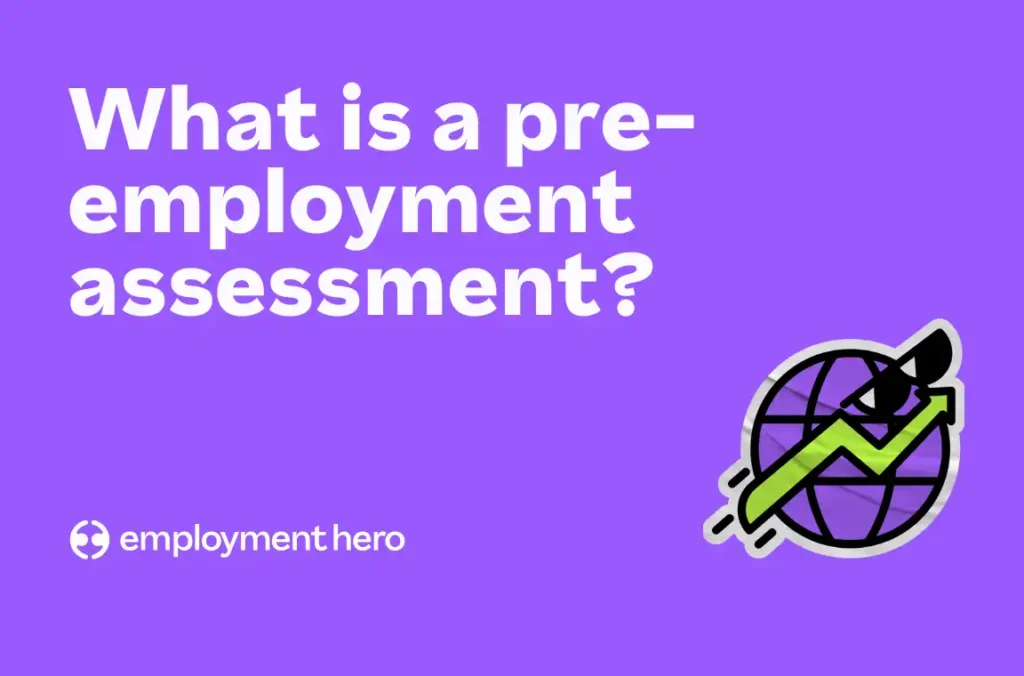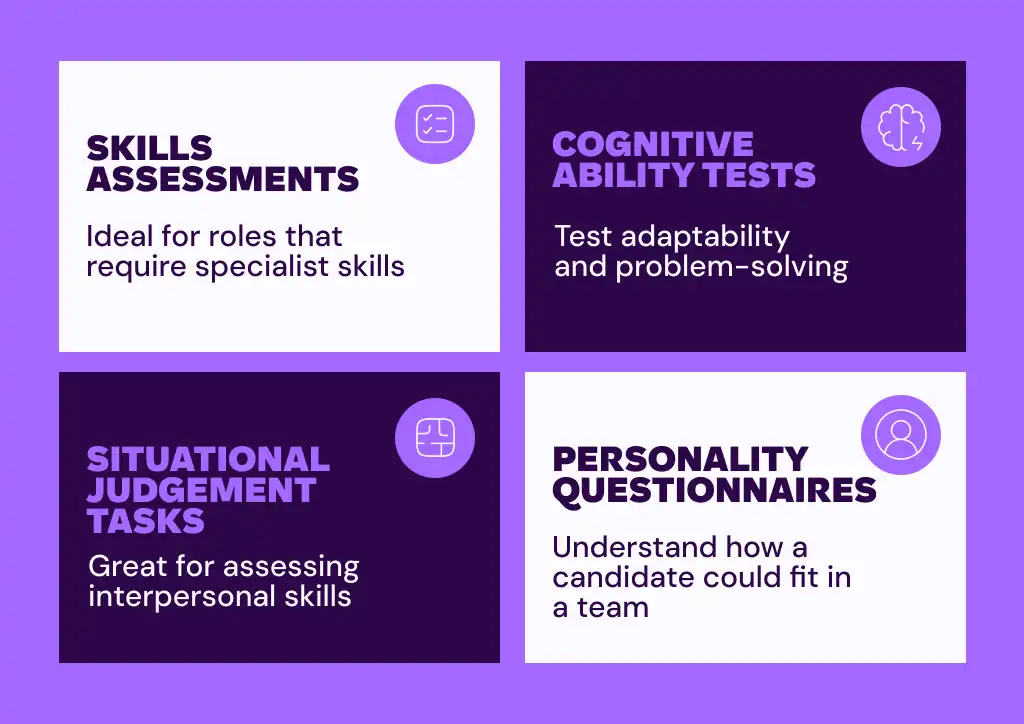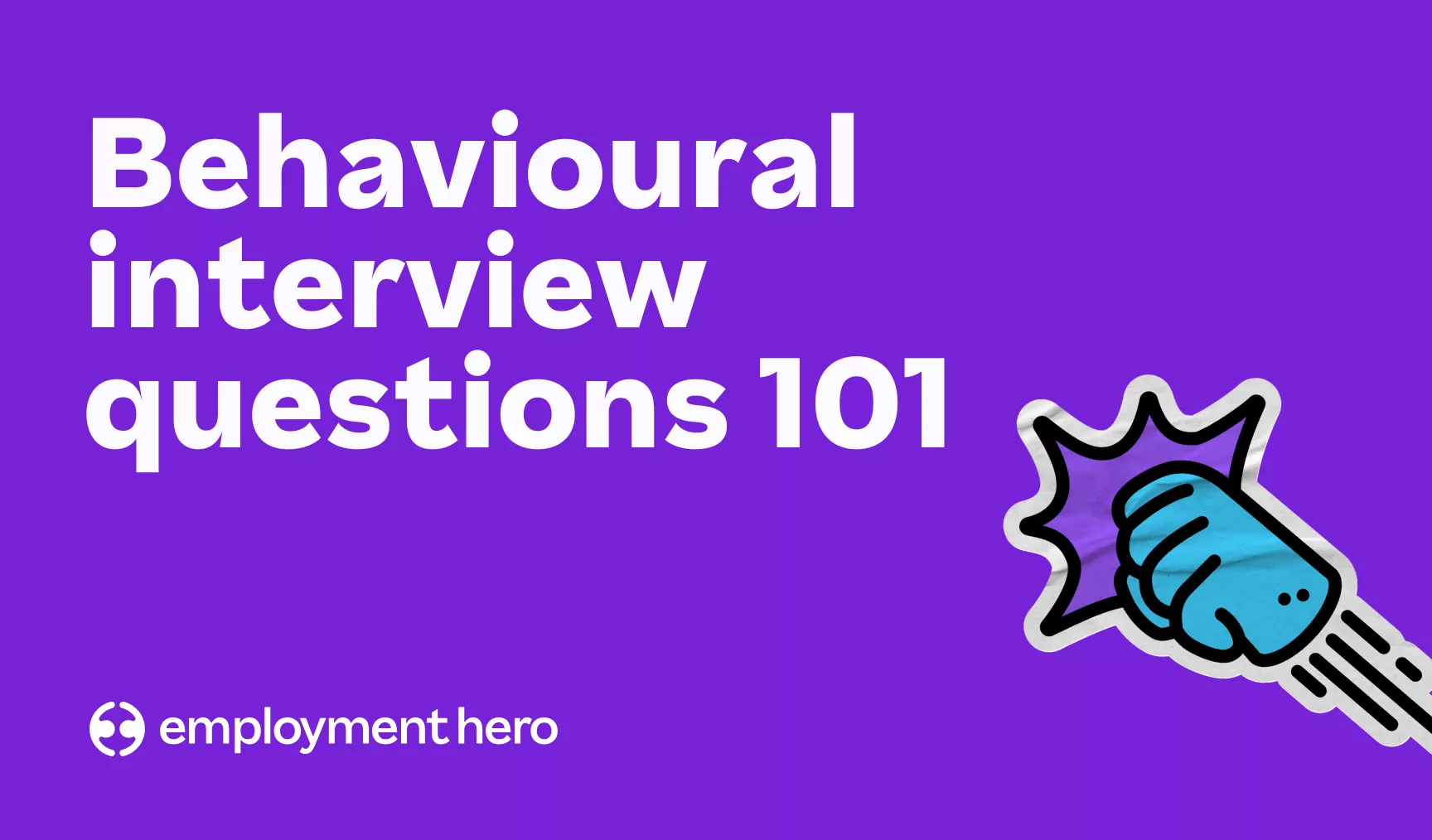What is a pre-employment assessment?
We’re sharing everything you need to know about pre-employment assessments; what they are, how they work and which ones are worth investing in.
-

Jen Denny

Contents
For New Zealand businesses, finding the right people is crucial. But with so many applicants and limited time, do you really know who you’re hiring?
Interviews and CVs only tell part of the story. If you’re serious about successful hiring, consider pre-employment assessment tools. They’re your secret weapon for making smarter, more confident decisions.
We’re sharing everything you need to know about pre-employment assessments; what they are, how they work and which ones are worth investing in.
What are pre-employment tests?
Pre-employment tests are assessments used by employers to measure a candidate’s skills, working style and knowledge for a specific job. Used well, these tests can help predict how well a person will perform in a role and if they’re the best person for the job.
There’s no one-size-fits-all when it comes to testing the suitability of a candidate. Some assessments, like cognitive ability tests, dig into how candidates approach problems and critical thinking under pressure. Others, like skills-based tests, evaluate a candidate’s abilities in relation to a role, which we’ll get into a little later.
Are pre-employment tests common in New Zealand?
There’s no hard and fast data on how common pre-employment tests are in New Zealand. In the US however, stats have revealed that 75% of employers now use some kind of pre-employment testing. According to Forbes, that’s a steep increase from the days when candidates simply sent in their CV and waited.
It’s only a matter of time before New Zealand follows suit (if it hasn’t already). Employment Hero’s State of Recruitment report revealed that on average, New Zealand hiring leaders spend more than 39 hours per week on hiring activities. The most time consuming of the activities emerged as candidate interviewing. When interviewing is taking up so much time, it’s in employers’ interests to narrow down the candidate lists as much as they can beforehand. That’s where testing can help.
Why is pre-employment testing important?
We know that for many New Zealand employers, budgets are looking a little tight. You’re also time poor, but for various reasons, you can’t afford to be complacent about hiring right now. To help your bottom line and ensure a successful business, your hiring has got to be effective. You need the right people and you need them soon.
Still, while it’s tempting to race through recruitment to get people in the door quickly, simply relying on CVs and interviews can be a risky game. Your hiring processes also have to be watertight. You need to ask the right questions of your candidates to ensure you’re making the best decision for your business.
Pre-employment testing and talent assessments can help you ask those questions. Introducing these additional assessments can also do the following:
Reduce hiring bias
Pre-employment tests provide objective data, allowing you to compare candidates based on measurable skills and attributes rather than subjective impressions.
Improve quality of hire
By assessing job-relevant skills and their workplace approach early on, you’re likely to choose candidates who will not only perform well, but thrive in your specific workplace culture.
Lower turnover rates
Making the wrong hiring decision is expensive. Employees not suited to the business can negatively impact team morale and productivity. Then, should they leave, replacing them costs time and money. That’s why informed hiring decisions are so important: they can significantly reduce employee turnover, saving your business valuable resources.
Streamline the hiring process
While it might seem like an extra step, effective pre-employment testing can actually make your hiring process much more streamlined. By filtering out unsuitable candidates earlier, you’ll spend less time on interviews with individuals who aren’t a good fit.
Enhance your employer brand
A comprehensive and fair hiring process reflects well on your reputation as an employer. Relevant talent assessments show candidates that your business is committed to making the right decision for both of you. They can also give candidates a useful insight into the role they’re considering, so they can make an informed choice too.

Examples of pre employment assessments
There are lots of pre-employment assessments out there. The type of tests you’ll choose will depend on your business, the kind of roles you’re hiring for and the qualities you’d like in a new team member.
To get you started, we’ll go over some of the most common types. Choose carefully – these will form a huge part of your candidate experience and the eventual success of your hiring efforts.
Skills assessments
If your job advertisement asks for a specialist skill, it helps to check that your candidate has the necessary knowledge. Skills assessments usually include some kind of task for the candidate that mimics what they would do in the role. The employer sets the scenario and indicates any relevant sources for context, as well as outlining the task.
For example, if interviewing for a sales role, employers could ask for a sample sales pitch. For a copywriting role, it could be a blog post on a particular topic.
There are a few golden rules for skills assessments. First, don’t use the candidate’s produced work for your business. You could be seen to be using their work as free labour. If the candidate finds out, word can get around and affect your employer brand negatively.
Second, don’t make the task too demanding. Remember that the candidates are not getting paid for completing these tests, so keep the time required minimal.
For more information on the limits of pre-employment skills assessments, visit the Employment NZ website.
If businesses follow these guidelines, skills assessments can be really useful for both the employer and the candidate. The employer can get a clear idea of the candidate’s abilities in practice, while the candidate gets an understanding of what the role entails.
When to use them
These tests are useful for roles where a lack of a specific skill would severely affect an employee’s ability to do their work. For example, creative and design roles, or technical roles such as software developers or data analysts.
By getting a clear idea of their abilities up front, employers can confirm which candidates could be suitable for the next step. It reduces the risk of unfortunate surprises down the line, if a candidate is not as qualified as believed.
Cognitive ability tests
Cognitive ability tests are the all-rounders of the pre-employment assessment world. Sometimes referred to as aptitude tests, they generally measure a candidate’s mental capabilities and problem-solving skills. It’s the ‘big picture’ view.
The criteria used in this test is broken into four sections:
- Verbal reasoning: How the candidate understands and interprets written information.
- Numerical reasoning: The candidate’s ability to work with numbers, interpret data, and solve mathematical problems.
- Abstract reasoning: Whether the candidate can identify patterns, solve non-verbal problems, and understand complex concepts.
- Logical reasoning: Their ability to draw conclusions from information and identify logical sequences.
The assessment results will score the candidate on how they perform in each of the categories.
When to use them
If a role requires quick learning, problem-solving or adaptability, a cognitive ability test is a good indicator of future success. They’re particularly useful for management positions, roles with complex data analysis, or any job where employees need to think on their feet.
For Small-to-Medium Enterprises (SMEs), that likely applies to quite a few roles. Use this assessment if you’re searching for agile thinkers who can quickly adapt to changing priorities.
Situational judgment tests
When faced with a challenge at work, what would you do? Situational judgement tests present candidates with hypothetical work-related scenarios and ask them to choose the best course of action from a set of options. Alternatively, they may have to rank different responses by their effectiveness.
These tests are designed to assess a candidate’s judgement and soft skills in tricky situations. How they respond will give you a sound indication of what they consider when challenged. They may take into account potential interactions with their colleagues, how to stay calm under pressure or the ethics behind their decisions.
When to use them
Situational judgement tests are excellent for roles that require sound judgement on the fly. This includes customer service roles, team leadership positions, sales roles, or any role where navigating complex interpersonal dynamics is key.
Psychometric tests (or personality questionnaires)
Psychometric tests usually cover a range of assessments that measure an individual’s psychological attributes, such as personality, motivation, and behavioural style. Technically cognitive ability and situational judgement tests fall under the category of psychometric tests, but they’re most often used to refer to assessments around the candidate’s personality.
Unlike the skills assessments, these questionnaires reveal and analyse the side of the candidate that is inherent to their nature. For example, someone may be able to learn coding, but they can’t necessarily change their extrovert tendencies at heart. However, these tests can be an opportunity for employers to understand how the candidates use their natural strengths in a workplace setting.
When to use them:
Personality tests are best used to understand how a candidate’s personality traits and soft skills might fit with the role and your team’s culture. These tests can offer insights into how a new hire might contribute to your team’s dynamics, helping you build a cohesive and productive environment.
However, remember that personality tests should be used as one piece of the puzzle. While a person may naturally gravitate to certain ways of thinking, they may be able to adapt to other ways when required.
For example – don’t rule out an introvert for a chatty sales role. Abraham Lincoln is one of the most famous orators and leaders ever and he was a natural introvert.
What is a pre-employment assessment tool?
For businesses who are short on time and resources, they may consider a pre-employment assessment tool. This is usually a type of software or platform that can pre-populate questions for tests or collect the results.
As to whether employers need those tools, it does depend on the type of assessments they’d like to use. For example, skills assessments vary by the role and it should be fairly intuitive for hiring managers to create a test that accurately reflects the work required. For more complex tests, such as personality tests and cognitive tests, pre-employment assessment tools can help with their creation and completion.
Hero Tip: We know there are lots of steps in the recruitment journey. Keep track of every candidate’s process with Employment Hero’s Applicant Tracking System. It comes with a huge range of features, including evaluation scorecards to rate a candidate’s answers to questions. Find out more about our Applicant Tracking System here.
How to choose the right talent assessment for your role
Once you’ve got the right talent assessment tests picked for your role, you’re well on your way to smart hiring decisions. When choosing which one to go for, break down the requirements of the role you’re hiring for. Once you understand what you’re looking for, you’ll be able to pick the right test for the job.
Are you asking for a skill that will be critical for the role? Go with a skills assessment.
Will the role require interpersonal skills and problem-solving? Situational judgement tests and cognitive ability tests could be useful to you.
Do you have a tight-knit team and you want to ensure the new team member adds to the culture? Consider bringing in a personality questionnaire.
By picking the right assessment type, you can send that offer of employment with confidence. It’ll greatly improve your hiring decisions, and potentially speed up your recruitment process overall.
Your best partner in recruitment? The Employment Operating System (EOS)
Pre-employment assessment tools aren’t the only thing that can streamline the recruitment process. Employment Hero’s world-first Employment Operating System (EOS) can transform recruitment from start to finish. From posting ads on job boards, to automating those initial CV checks, finding the right talent has never been easier.
EOS gives you access to a world of talent, with the right candidates automatically matched to roles in your business. That’s a whole lot of time saved. Instead, you’ll be able to focus on nailing the right talent assessment tests and making successful hiring decisions.
Finally, once your candidate has accepted your offer, set the ball rolling with onboarding features that make their first day a breeze.
Ready to transform your hiring process? Book a demo of the Employment Operating System today.
Related Resources
-
 Read more: The importance of behavioural interview questions for NZ employers
Read more: The importance of behavioural interview questions for NZ employersThe importance of behavioural interview questions for NZ employers
Discover the top behavioural interview questions in NZ and learn effective strategies to find the best candidate for your business.
-
 Read more: Should employers use psychometric tests in recruitment?
Read more: Should employers use psychometric tests in recruitment?Should employers use psychometric tests in recruitment?
Learn how psychometric tests work and how to implement them into your hiring process.





















